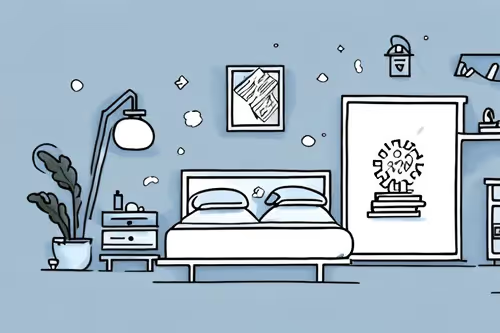If you've had trouble falling asleep or suffered from insomnia, you are not alone. Our minds have a knack for going into overdrive just as we're trying to wind down for sleep. This overthinking can spiral into anxiety, creating a frustrating cycle that keeps us from getting the rest we need.
It starts innocently enough. You turn out the lights, climb into bed and something on your to-do list comes to mind.
“Remember, I want to talk about xyz in the presentation tomorrow.”
But then, suddenly, another thought creeps in.
“Did I respond to that email?”
Before you know it, you have drifted a world away from the soft inviting sheets of a peaceful night's rest. Your mind kicks into overdrive as thoughts move in quick succession. This turns into ruminating—repetitive or obsessive thoughts or negative feelings that send your mind spiraling into relentless anxiety.
The racing thoughts come from all angles- one minute it’s worrying about the day ahead, the next minute, you're reliving and recalling past experiences — maybe even trying to solve world peace!
Why do I have racing thoughts when I'm trying to sleep?
During the day we stay busy and focused. We may be concentrating on tasks at work, interacting with others, handling chores, or even just watching a movie. With constant activity during the day, we are less likely to pay attention to and make space for overthinking.
But when we hit the lights and start to nestle into bed, there are fewer distractions from anxiety and stress. Our thoughts take center stage and get the full spotlight of our attention!
What is the cause of racing thoughts at night?
Racing thoughts at night are usually tied to stress and anxiety. When you're stressed or anxious, your mind buzzes with unresolved issues and endless scenarios. Compound this with being overstimulated—too much screen time or caffeine before bed—and the racing thoughts can completely disrupt your sleep, impacting your mental health and wellness even further. This all becomes a loop of anxiety and sleeplessness that gets replayed each night.
How do racing thoughts disrupt sleep and wellbeing?
When your mind is overactive, it can be tough to fall asleep initially. Even if you manage to drift off, recurring thoughts can wake you up in the middle of the night, leading to intermittent wakefulness. Over time, these disruptions add up, negatively impacting your sleep quality and health. The first step to supporting your sleep journey is to determine the origin of your problem.
- Difficulty Falling Asleep: This is when an overactive mind makes it hard to relax and fall asleep, as racing thoughts can keep the brain alert and prevent it from entering a state of rest and relaxation.
- Nighttime Awakenings: Recurring thoughts can wake you up at night, disrupting your sleep cycle and making it difficult to return to restful sleep.
- Poor Sleep Quality: Disrupted sleep caused by racing thoughts affects overall health and wellbeing by reducing the restorative sleep needed for physical and mental rejuvenation, leading to daytime fatigue and decreased cognitive function.
Knowing your patterns will help. For many people with sleep issues, a racing mind is at least partly to blame.
How do I stop racing thoughts when trying to sleep?
Fortunately, making consistent lifestyle changes to manage stress, anxiety and overstimulation can significantly reduce racing thoughts that keep you up at night. These adjustments help calm the mind at night and allow you to relax for a deep restful sleep.
Other ways to prevent and stop racing thoughts include:
- Avoid overstimulation. Reduce screen time and caffeine intake in the evenings to help calm your mind and prepare your body for sleep. Turning off electronic devices at least an hour before bed and avoiding caffeinated beverages from the afternoon onward can make a significant difference in reducing racing thoughts. Try to find relaxing alternatives. Instead of screen time, try reading a book or journaling. A warm cup of chamomile or herbal tea can be a relaxing alternative to sodas, teas, and coffees that could keep you awake and alert when you wish to be sleeping.
- Create an evening wind-down routine. Start to establish a relaxing routine a few hours before bedtime. Establishing a consistent pre-sleep ritual will signal to your body that it's time to rest. This can include activities like taking a warm bath, practicing gentle yoga or stretching, practicing yoga nidra (deep relaxation), or meditating.
- Aim for a consistent sleep schedule. Try to go to bed and wake up at the same time every day, even on weekends. This helps regulate your body's internal clock and promotes a natural circadian rhythm. Circadian rhythms play a crucial role in your sleeping and waking patterns by regulating core body temperature, immune function, hormonal balance, metabolism, cognitive performance, and stress responses.
- Explore sleep meditations. Sleep meditations, audio meditation tracks that lull you to sleep, can instantly help you relax and calm racing thoughts. Many sleep meditations use practices such as breathwork and progressive body relaxation to relax you into sleep or return you to sleep if you wake up during the night.
How does meditation reduce stress and anxiety?
Meditation and sleep meditation both offer powerful tools for managing stress and promoting relaxation.
Meditation generally involves techniques aimed at cultivating mindfulness, enhancing awareness, and fostering a sense of inner peace throughout the day. By contrast, sleep meditation specifically targets calming the mind and body to help you to fall asleep.
Both practices share the common goal of reducing stress, improving emotional wellbeing and enhancing overall sleep quality by calming the nervous system and quieting the mind's incessant chatter. Both meditation and sleep meditations use techniques such as guided visualization, progressive relaxation, and deep breathing exercises, which regulate the body's nervous system by encouraging a relaxation response.
Practicing meditation and sleep meditation reduces mental clutter and helps you to enjoy a restful sleep. Making these techniques part of your daily lifestyle are key in breaking the cycle of anxiety and racing thoughts because they effectively help manage stress and anxiety. This makes meditation both a short-term and long-term solution for better sleep patterns and overall wellbeing.
Overall, many lifestyle factors affect how stress and anxiety impact sleep quality. By focusing on creating new habits that promote relaxation and calmness, you can enjoy improved sleep, reduced anxiety and enhanced overall wellness. Consistency is key to achieving sustainable improvements in your sleep quality. Over time, improving your lifestyle habits and behaviors will transform your racing thoughts into a peaceful night’s sleep.
If you’re looking for more guidance and community support, along with gratitude meditations to support your journey, join me at Aura, the most holistic meditation app on the market, for 30 days free.



.webp)







.avif)

%20(1).avif)


.avif)
.avif)
.webp)


.avif)


















































































































.avif)

















.svg)









